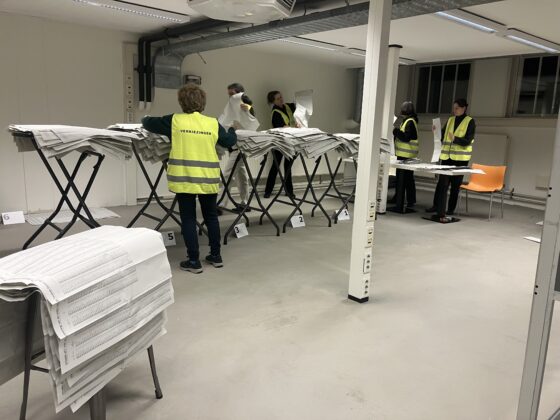The Netherlands shifts to the centre: Rob Jetten set to be PM

The Netherlands is set to have a liberal prime minister in 38-year-old Rob Jetten, although the political direction of a new coalition government remains very unclear.
According to exit polls, the liberal democratic party D66 is set to be the largest, with 27 seats in the 150-seat lower house of parliament, which will be made up of 15 different parties. Turnout was some 76%, slightly down on 2023.
Even if the far-right PVV wins the popular vote, all the other major parties have said they will not work with Geert Wilders in forming a new cabinet, which means Jetten will become prime minister by default.
D66 celebrated the results in Leiden. As Rob Jetten, who will marry his Argentine partner next year, bounced onto the stage, the room of 700 party supporters erupted into a chant of “het kan wel – yes we can, yes we can!”
The mood was euphoric as Jetten said they would “close the Wilders chapter” and move towards a positive future.
“There needs to be a cabinet that represents all Dutch people, so that in four years this does not have to be a theme any more,” Jetten told reporters afterwards in a press room mobbed by some 50 journalists from the Netherlands and abroad. “D66 has shown that it can bridge very big differences by working together.
“We need to build a stable cabinet together that gets to work quickly on the big issues of this campaign.”
The exit poll results led to the immediate resignation of GroenLinks-PvdA leader Frans Timmermans following the party’s poor showing. The exit poll said the alliance is on course to win 20 seats, a loss of four compared with the 2023 election. Timmermans had made it clear before the vote that he wanted to be prime minister.
In a short speech to party supporters, he said he was very disappointed with the results and that he had not been able to convince enough people to support the GroenLinks-PvdA message.
“As leader, I will take responsibility for that,” he said. “It is time for me to step back and give the leadership to the next generation. That is what a leader should do.”
The GroenLinks-PvdA alliance will meet on Thursday to discuss who will succeed Timmermans as party leader. Former GroenLinks leader Jesse Klaver and Amsterdam’s social affairs chief Marjolein Moorman are the most touted names.
Moorman told broadcaster NOS that she was very sad about Timmermans’ departure but declined to respond to questions about her future. “I am happy that people voted by a large majority for democratic parties,” she said.

Wilders’ support plummets
In The Hague, PVV leader Geert Wilders, who is in line to lose 12 of the 37 seats he won at the 2023 general election, said he had hoped for a different result.
Wilders sparked the collapse of the current coalition in the summer by withdrawing his ministers in a dispute over tighter asylum rules. Since then, all the other major parties have said they will not form a coalition with him again.
He said his party had shown backbone by leaving the coalition government and that he had no regrets about doing so. He added that the refusal of many parties to form a new cabinet with the PVV may have led some supporters to vote elsewhere.
“We still have 1.7 million voters and are still a very big party in the Netherlands,” he said.
NOS exit poll results
D66 27 (9)
PVV 25 (37)
VVD 23 (24)
GL-PvdA 20 (25)
CDA 19 (5)
JA21 9 (1)
FvD 6 (3)
BBB 4 (7)
SP 3 (5)
Denk 3 (3)
PvdD 3 (3)
SGP 3 (3)
CU 2 (3)
Volt 1 (2)
50+ 2 (0)
VVD leader Dilan Yesilgöz took to the stage at her party’s post-election event to chants of “Dilan, Dilan”. She thanked her team, who she said had fought like lions. Some polls had put the party’s support as low as 15 seats earlier in the campaign.
Yesilgöz also went on to congratulate D66, the CDA and JA21 on their gains in the polls. She also repeated her earlier statement that she hopes to be part of a centre-right government with the three other parties – which would just be possible if the exit poll is accurate.
Jetten, however, indicated in post poll interviews that he would go for a coalition made up of the CDA, GroenLinks-PvdA and the VVD. Those four parties plus the PVV will be the biggest once all the votes are counted and such a combination would be the “logical” choice, he said.
That means the direction of the next Dutch cabinet remains open. A centre left coalition could count on 88 seats in the lower house of parliament, while a centre right alliance including D66 would have 79 – which commentators say is too risky for a stable coalition.
Thank you for donating to DutchNews.nl.
We could not provide the Dutch News service, and keep it free of charge, without the generous support of our readers. Your donations allow us to report on issues you tell us matter, and provide you with a summary of the most important Dutch news each day.
Make a donation